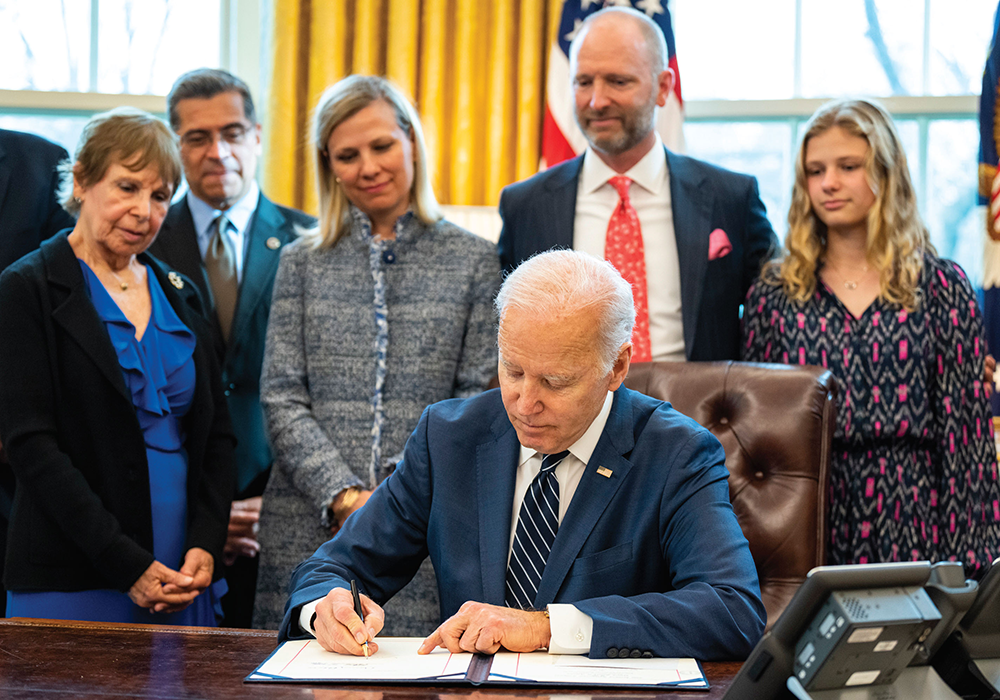In a clarion call for action seven years ago, President Barack Obama unveiled the Cancer Moonshot during his last State of the Union address. In that speech, Obama recalled, “Last year, Vice President Joe Biden said that with a new moonshot, America can cure cancer. Tonight, I’m announcing a new national effort to get it done. And I’m putting Joe in charge of Mission Control.”
Funded through the 21st Century Cures Act, it led to countless research discoveries, treatment advancements, and practice changes—enabling ONS, oncology nurses, and all healthcare providers to make great strides in the transformation of care for patients with cancer.
Preparing for Another Takeoff
Now as the standing U.S. president, gathering the cancer community, patient advocates, policy leaders, and healthcare providers, Biden announced in February 2022 that he is relaunching the initiative with a new goal: to “end cancer as we know it” and work across party lines to achieve it.
Biden said that the new Cancer Moonshot will build on the progress from its 2016 predecessor, such as advancements in precision medicine and therapies for lung, skin, and blood cancers. He recognized that growth in prevention and early detection strategies has saved countless lives because of innovation. Scientists and researchers achieve great strides when they rally to tackle cancer, and we can do it again.
Building a New Crew
Beyond the biomedical research community, Biden’s new Moonshot enlists public health experts to improve outreach to underserved communities, the private sector to develop new tools for data collection, and importantly, “people living with cancer and survivors, their caregivers and families, and those who have lost someone.”
Much of the next Moonshot’s phases are directed through the White House Office of Science and Technology Policy. In 2021, the Biden-Harris administration created a new health agency dedicated to finding biomedical breakthroughs, “ranging from molecular to societal, that would provide transformative solutions for all patients.” Dubbed the Advanced Research Projects Agency for Health (ARPA-H), it will work in conjunction with the National Institutes of Health. However, obtaining the three-year, $6.5 billion funding needed to support the new agency has been challenging.
Bringing Oncology Nurses on Board
Attached to the first Moonshot was a task force charged with consulting specialists from health, science, and clinical care to find real-world solutions that would have meaningful impact on patients and survivors. Both as task force members and expert consultants, oncology nurses were pivotal partners in those discussions and contributed to the progress made in quality care outcomes. ONS was also a partner and vocal supporter of the 2016 Moonshot, and our members are still involved with several boards and commissions.
ONS Past President Deborah Mayer, PhD, RN, AOCN®, FAAN, who was a member of the National Cancer Institute Blue Ribbon Panel, offered some insight into the process. “It was decided very early on that we needed to cover the continuum of cancer care. I was very happy that our group recommended the focus on symptom management, because it allows us to address survivorship issues, palliative care issues, and end-of-life issues under the big umbrella of care,” she said.
As the Cancer Moonshot relaunch unfolds, oncology nurses are vital to improving patient-centered care and quality outcomes. Nurses guide patients throughout coordinated care, and policy leaders look to nurses to represent the patient continuum from diagnosis through survivorship. ONS actively engages with decision-makers to connect them with oncology nurses for those important conversations. If you would like to be a voice for your patients and profession, email astone@ons.org to get involved.






